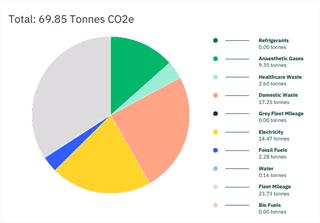Dr. Gudrun Ravetz

Photo courtesy of Vet Sustain
Dr. Gudrun Ravetz, pictured with her dog Tess, heads Vet Sustain, a volunteer group that has launched a carbon footprint calculator for the veterinary profession. Ravetz is a past president of the British Veterinary Association, one of several professional organizations endorsing the new tool.
In what may be a world first, veterinarians in the United Kingdom have launched a carbon-footprint calculator tailored to the environmental impacts of veterinary practice.
The Veterinary Carbon Calculator was debuted this week at the London Vet Show by Vet Sustain, a volunteer organization founded in 2019 by a group of environmentally conscious practitioners.
It allows businesses to assess how many metric tons of carbon dioxide they generate over a given time period by entering data for a range of factors, such as energy usage, transport and waste. Vet Sustain charges users up to £180 (US$214) per overall calculation to cover its costs.
The calculator was developed in partnership with Investors in the Environment (IIE), an environmental accreditation service run by a charity known as PECT that was set up in 1993 by the English city of Peterborough for environmental projects. The carbon calculator has been endorsed by the U.K.'s main professional associations, including the British Veterinary Association.
About 10 months in the making, the tool currently is appropriate only for U.K practices because it uses local metrics, particularly for energy usage. Vet Sustain, however, is keen for the calculator to be adapted for international use, perhaps via partnerships with other organizations that could adopt its core functionality.
"Our industry has a massive impact on the environment, both in terms of the carbon we use running veterinary practices and in terms of the amount our clients use caring for their animals," Vet Sustain's chair, Dr. Gudrun Ravetz, said in an interview. "But if we can't measure it, it's difficult to hold ourselves accountable and improve."
Tools that measure the carbon footprints of individuals, households or businesses are not new. Free calculators are available online, such as a tool for businesses offered by the CoolClimate Network, a partnership of the University of California, Berkeley, with government, business and nongovernment organizations.
More sophisticated tools also are available, usually for larger businesses, from private firms that tout high-precision measurements that meet global sustainability reporting standards.
The new calculator is different in that it offers a relatively cheap and straightforward means of assessing a veterinary practice's carbon footprint that takes into account unique elements of veterinary medicine, according to April Sotomayor, general manager and principal consultant at IIE.
"There are specific metrics that we've added here that are particular to the waste streams and the anesthetic gases that are used in veterinary practice," Sotomayor said. "And a main focus of this particular calculator, because it's aimed at nonexperts, is trying to simplify the technical side of carbon calculation and get practices to understand their carbon hotspots."
Ravetz said Vet Sustain was inspired to create the calculator partly because the group couldn't find existing veterinary-specific tools. "Even when we looked at general practice ones for human medicine, we found they didn't use the same anesthetic gases. The waste was different," she said. "If you're looking at production animal practices, there's a lot of driving around; there's a lot of ambulatory work. So there's nuances for a veterinary practice that weren't being catered for in generic carbon calculators."
Vet Sustain and IIE have developed educational materials intended to help users shrink their carbon footprints year-over-year. The group also hopes to collect sufficient data from users to establish benchmarks that practices can consider in setting their goals.
The tool's launch comes as world leaders and activists gathering at the COP27, the United Nations climate change meeting in Egypt, attempt to forge plans to reduce greenhouse gas emissions globally. The conference, which started Nov. 6, was scheduled to wrap up today but likely will run overtime as participants struggle to find common ground and approve meaningful agreements.
The health care sector's impact on the environment, including from veterinary medicine, typically doesn't attract as much scrutiny as sectors such as energy, transportation and agriculture.
However, as the potential effects of climate change become more apparent, greater attention is being paid to how medical practitioners can reduce their carbon footprints. For instance, moves to limit the usage of inhaled anesthetics, which are disproportionately potent greenhouse gases, have been endorsed by professional associations, educational institutions and owners of veterinary practices, including Mars Inc., the world's largest.
pollutant chart

Image courtesy of Vet Sustain
Elements that contribute to an English veterinary practice's carbon footprint in 2021 are shown in a pie chart that was generated by an online measurement tool tailored to the profession. The figures are expressed as carbon dioxide equivalents in metric tons.
Still, the issue of climate change remains as divisive within the veterinary profession as it does elsewhere. On discussion boards of the Veterinary Information Network, an online community for the profession and parent of the VIN News Service, some practitioners endorse being mindful of reducing their carbon footprint. Others note that the veterinary sector's contribution to global carbon emissions is relatively small compared with that of others, such as human medicine's.
Some evidence suggests a substantial proportion of veterinarians are concerned about the issue, at least in the U.K. A survey of 430 British practitioners by the BVA last year found that 97% considered environmental sustainability to be "quite important" or "very important." Close to three-quarters (73%) said veterinary professionals are very (26%) or quite (47%) responsible for prioritizing and leading on issues around environmental health.
Ravetz, a former president of the BVA, maintains that veterinarians can have a big impact on emissions, not only through the day-to-day running of practices but on the influence they have on animal owners.
"We know it's not just food production that creates emissions. We also know that our companion animals have an enormous paw print," she said. "We have an advocacy role to impact what animal owners do. But to influence them, we need to get our own house in order."